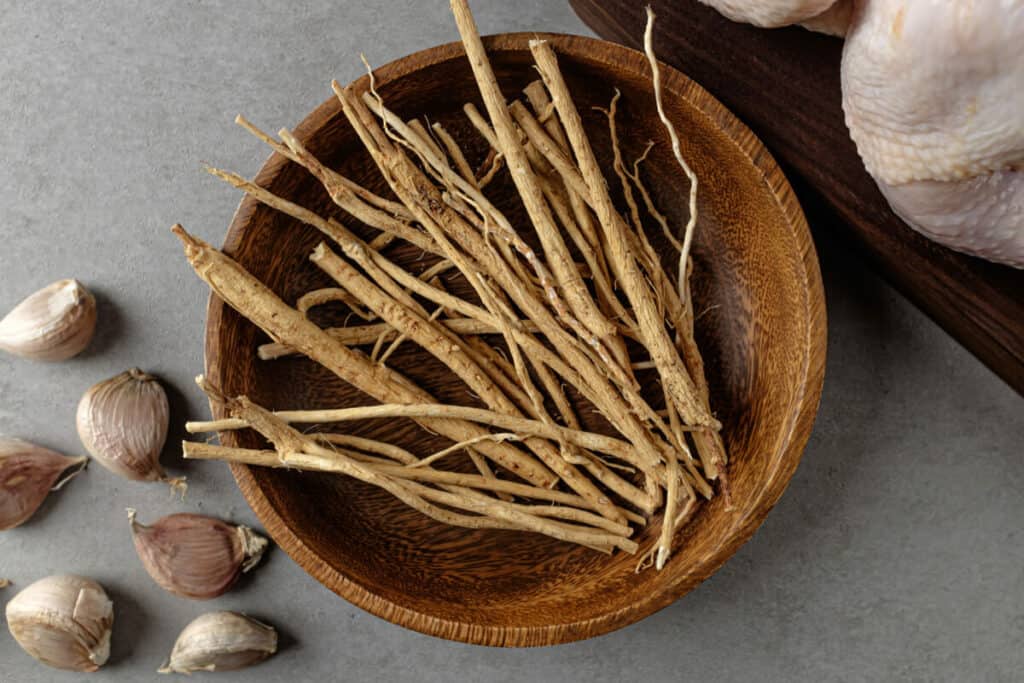Astragalus membranaceus, commonly known as astragalus, has been used as a medicinal remedy in Traditional Chinese medicine (TCM) for more than 2,000 years (6)(8) for its antioxidant, anti-inflammatory, immunoregulatory, anti-cancer, hepatoprotective, and diuretic effects on human physiology. (6) It may provide benefits for strengthening the immune system, healing respiratory infections, improving kidney disease, and healing the skin topically. Astragalus is also a source of choline, amino acids, calcium, copper, magnesium, and potassium, as well as many other beneficial nutritional compounds. (8) Continue reading to learn more about astragalus and its benefits.

Astragalus benefits
Astragalus root can be found in many forms such as teas and powders, tinctures and capsules. This multi-purpose medicinal root may improve immune function, lung health, skin health, and kidney function. (1)(2)(5)(9)(11)(14)
Astragalus benefits for immune health
More than ever, our immune systems are top of mind. The main job of this system is to protect our bodies against foreign invaders, such as viruses and bacteria we come in contact with in our everyday environments. Astragalus’ bioactive components may support our immune system by increasing white blood cell activity, which is essential for preventing and fighting infection and illness caused by viruses and bacteria. (1)(9)(11)
Astragalus benefits for lungs
Along with supporting immunity, astragalus may be beneficial for lung health. Used for thousands of years as a remedy for respiratory infection, research has shown that supplementing with extracts of astragalus root may reduce the length and intensity of respiratory infections, such as the common cold. (1)

Astragalus benefits for skin
The anti-inflammatory effects of astragalus may be beneficial in addressing inflammatory skin conditions, such as psoriasis. (2)(11) Researchers have investigated the role astragalus has in targeting neutrophils (innate immune cells) to reduce psoriasis-like skin inflammation in mice. The study concluded that the herb may provide anti-inflammatory activity that could position astragalus as a therapeutic remedy for inflammatory skin conditions. (2) However, further human studies are needed to confirm these effects.
The therapeutic properties of astragalus have also been studied in atopic dermatitis, a recurring inflammatory skin condition that involves dysregulation of the skin barrier. One study suggested combining astragalus with the herb Angelica sinensis and concluded that the two together may be even more effective for treating inflammatory skin conditions. The researchers attributed the beneficial effects of the astragalus root to its anti-allergic and anti-inflammatory activity. (3)
Astragalus benefits for kidneys
Astragalus is one of the most common herbs used for addressing kidney dysfunction and improving markers of kidney disease. (5)(14) It has been used together with Angelica sinesis for thousands of years in both East Asia and China to treat kidney disease; however, modern science is still investigating the ways in which these herbs protect the kidneys against oxidative stress and kidney disease. (12)
Some research has examined the use of astragalus in patients with chronic kidney disease (CKD), concluding that therapeutic doses of the herb may help stabilize markers of CKD, like eGFR, and potentially reduce the need for a kidney transplant in patients with stage 4 CKD. (5)(10)

Kidney function can often be measured by the levels of protein in urine, with higher levels being an indication of poor kidney function. When higher than usual amounts of protein are found in urine, this can be a sign that the kidneys are not functioning as they should, a disorder referred to as proteinuria. (4) Injections of astragalus have been shown to reduce protein makers in the urine as well as other markers of kidney health such as T-lymphocytes levels within three weeks, suggesting regular supplementation of astragalus may be beneficial for those struggling with proteinuria. (4)
Supplemental astragalus, especially injections should only be used under the supervision of a healthcare practitioner.
Astragalus side effects
Generally speaking, regular oral supplementation with appropriate dosing is well tolerated, with few side effects for the majority of the population. However, possible side effects of astragalus can include skin rashes, itchy skin, nasal congestion, and stomach discomfort. (8)
Safety considerations
It is recommended to avoid astragalus during pregnancy and breastfeeding as there has been little research done on the safety of supplementation during these times. However, a small animal study showed that the consumption of astragalus can be toxic to the mother and fetus. (8)
Given astragalus’ immune regulatory effects, it’s also not recommended that those with autoimmune conditions, such as lupus or multiple sclerosis, supplement with astragalus. (7) Taking astragalus regularly can also negatively affect prescription medications that suppress the immune system. It’s always important to consult with your healthcare practitioner before starting to supplement with astragalus. (8)
The bottom line
Used as a remedy in TCM for thousands of years, modern research has confirmed and demonstrated a number of possible benefits of astragalus. (8) Its bioactive components have been studied for their ability to support the immune system, heal respiratory infections, improve kidney disease, and address inflammatory skin conditions such as psoriasis.
- Block, K. I., & Mead, M. N. (2003). Immune System Effects of Echinacea, Ginseng, and Astragalus: A Review. Integrative Cancer Therapies, 2(3), 247–267.
- Cheng, W. J., Chiang, C. C., Lin, C. Y., Chen, Y. L., Leu, Y. L., Sie, J. Y., Chen, W. L., Hsu, C. Y., Kuo, J. J., & Hwang, T. L. (2021). Astragalus mongholicus Bunge Water Extract Exhibits Anti-inflammatory Effects in Human Neutrophils and Alleviates Imiquimod-Induced Psoriasis-Like Skin Inflammation in Mice. Frontiers in Pharmacology, 12.
- Choi, Y. Y., Kim, M. H., Hong, J., Kim, K., & Yang, W. M. (2016). Effect of Dangguibohyul-Tang, a Mixed Extract of Astragalus membranaceus and Angelica sinensis, on Allergic and Inflammatory Skin Reaction Compared with Single Extracts of Astragalus membranaceusor Angelica sinensis. Evidence-Based Complementary and Alternative Medicine, 2016, 1–9.
- Junfeng, S., Hanwei, Z., & Chong, Z. (2002). Therapeutic Efficacy of Astragalus in Patients with Chronic Glomerulonephritis. Acta Universitatis Medicinalis Secondae Shanghai, 22(3), 245–247.
- Li, X., & Wang, H. (2005). Chinese Herbal Medicine in the Treatment of Chronic Kidney Disease. Advances in Chronic Kidney Disease, 12(3), 276–281.
- Liu, P., Zhao, H., & Luo, Y. (2017). Anti-Aging Implications of Astragalus Membranaceus (Huangqi): A Well-Known Chinese Tonic. Aging and Disease, 8(6), 868.
- M, T., & Rakel, D. (2018). Integrative Medicine. In Chronic Hepatitis (Fourth). https://www.sciencedirect.com/topics/pharmacology-toxicology-and-pharmaceutical-science/astragalus#:~:text=Astragalus%20should%20be%20avoided%20in,of%20antithrombotic%20and%20anticoagulant%20medications.
- National Center for Complementary and Integrative Health. (2020, August). Astragalus. NCCIH. https://www.nccih.nih.gov/health/astragalus
- Ny, V., Houška, M., Pavela, R., & Tříska, J. (2021). Potential benefits of incorporating Astragalus membranaceus into the diet of people undergoing disease treatment: An overview. Journal of Functional Foods, 77, 104339.
- Okuda, M., Horikoshi, S., Matsumoto, M., Tanimoto, M., Yasui, H., & Tomino, Y. (2012, April). Beneficial effect of Astragalus membranaceus on estimated glomerular filtration rate in patients with progressive chronic kidney disease. Hong Kong Journal of Nephrology, 14(1), 17–23.
- Sharajabian, M. H. (2019). A review of astragalus species as foodstuffs, dietary supplements, a traditional Chinese medicines and a part of modern pharmaceutical science. Applied Ecology and Environmental Research, 17(6).
- Shahzad, M., Small, D. M., Morais, C., Wojcikowski, K., Shabbir, A., & Gobe, G. C. (2016, February). Protection against oxidative stress-induced apoptosis in kidney epithelium by Angelica and Astragalus. Journal of Ethnopharmacology, 179, 412–419.
- Sun, W., Shahrajabian, M. H., & Cheng, Q. (2019). Therapeutic Roles of Goji Berry and Ginseng in Traditional Chinese. Journal of Nutrition and Food Security.
- Zhang, H. W., Lin, Z. X., Xu, C., Leung, C., & Chan, L. S. (2014). Astragalus (a traditional Chinese medicine) for treating chronic kidney disease. Cochrane Database of Systematic Reviews.





